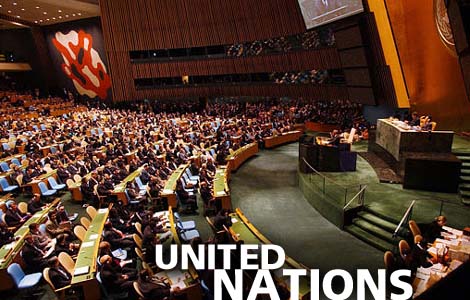Conflict remains endemic in most of Africa, UN says
 New York - The UN Security Council discussed Wednesday ways to improve cooperation with the African Union after a study showed that peace still does not exist in many parts of Africa despite the deployment of largescale UN peacekeeping operations.
New York - The UN Security Council discussed Wednesday ways to improve cooperation with the African Union after a study showed that peace still does not exist in many parts of Africa despite the deployment of largescale UN peacekeeping operations.
"From the Horn to the Great Lakes to West Africa, conflict is endemic," said the study by a six-member panel headed by former Italian Prime Minister and European Union statesman Romano Prodi.
"New threats continue to undermine political stability, even though in the past years there has been progress both in achieving peace and economic growth," the study said.
UN Secretary General Ban Ki-moon, who opened a one-day debate by the 15-nation council, said the role played by regional organizations like the AU is indispensable to the work of the council.
"Many of the challenges facing the African Union result from the difficulties it faces in securing the necessary resources to support both its deployments and its own long-term development," Ban said.
He said an under-resourced peacekeeping operation can imperil the initial benefits that come through its deployment.
The AU and UN are heading a joint peacekeeping mission in Sudan's troubled Darfur region, which has been slow in reaching the authorized ceiling of nearly 30,000 military and civilian personnel. About 13,000 personnel have so far been deployed.
The study said Africa, more than any other continent, has felt "most acutely" the cost of conflicts, deaths and problems associated with the destruction of infrastructure, the environment and diseases.
Of the 63 UN peacekeeping operations deployed around the world since 1948, nearly half took place in Africa. The UN operations in Liberia, Democratic Republic of Congo and Sudan are some of the largest in the world. The UN peacekeeping cost in Africa amounted to 5.1 billion dollars a year, of the global peacekeeping expenditures of 7.1 billion dollars.
The study cited one lesson learned in Africa as the crucial need to develop the capacity to support peace operations, including the need to generate and deploy them within a time frame with all necessary resources, equipment and personnel.
It said the AU is facing institutional weaknesses because the organization is in transition. Its original structures and procedures are now at odds with demands for a proactive involvement in peace missions on the continent.
The study recommended ways to strengthen the AU, including building up its capacity to respond to crises and the capability to promote long-term stability in Africa. (dpa)